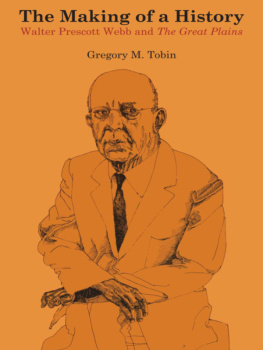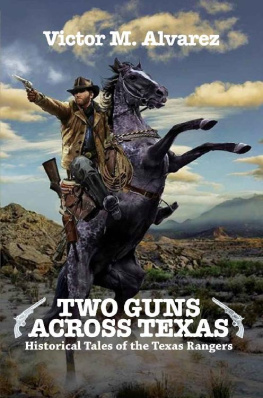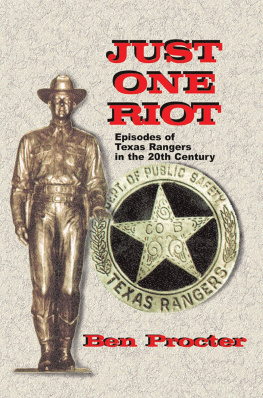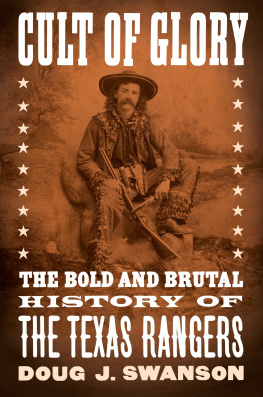Walter Prescott Webb - The Texas Rangers
Here you can read online Walter Prescott Webb - The Texas Rangers full text of the book (entire story) in english for free. Download pdf and epub, get meaning, cover and reviews about this ebook. year: 1965, publisher: University of Texas Press, genre: Home and family. Description of the work, (preface) as well as reviews are available. Best literature library LitArk.com created for fans of good reading and offers a wide selection of genres:
Romance novel
Science fiction
Adventure
Detective
Science
History
Home and family
Prose
Art
Politics
Computer
Non-fiction
Religion
Business
Children
Humor
Choose a favorite category and find really read worthwhile books. Enjoy immersion in the world of imagination, feel the emotions of the characters or learn something new for yourself, make an fascinating discovery.

- Book:The Texas Rangers
- Author:
- Publisher:University of Texas Press
- Genre:
- Year:1965
- Rating:3 / 5
- Favourites:Add to favourites
- Your mark:
- 60
- 1
- 2
- 3
- 4
- 5
The Texas Rangers: summary, description and annotation
We offer to read an annotation, description, summary or preface (depends on what the author of the book "The Texas Rangers" wrote himself). If you haven't found the necessary information about the book — write in the comments, we will try to find it.
This classic history of the Texas Rangers has been popular ever since its first publication in 1935.
The Texas Rangers — read online for free the complete book (whole text) full work
Below is the text of the book, divided by pages. System saving the place of the last page read, allows you to conveniently read the book "The Texas Rangers" online for free, without having to search again every time where you left off. Put a bookmark, and you can go to the page where you finished reading at any time.
Font size:
Interval:
Bookmark:
The Texas Rangers
A CENTURY OF FRONTIER DEFENSE
by WALTER PRESCOTT WEBB

Illustrated with Drawings by Lonnie Rees and with Photographs
FOREWORD BY LYNDON B. JOHNSON

The title page picture is from a painting by Tom Lea, Ranger Escort West of the Pecos. The original work is a gift to the state of Texas from C. R. Smith, chairman of the board of American Airlines. Governor John B. Connally accepted the painting in 1965 for permanent display in the governors office. It is used here with the permission of Tom Lea and Governor Connally. The two men in the foreground are Colonel George W. Baylor, left, and Sergeant J. B. Gillett, two illustrious figures in the colorful history of the Texas Rangers.
International Standard Book Numbegr 978-0-292-73400-5
(cloth); 978-0-292-78110-8 (paper)
Library of Congress Catalog Card Number 65-23166
Copyright 1935 by Walter Prescott Webb
Copyright 1965 by Terrell Maverick Webb
All rights reserved
Printed in the United States of America
SECOND EDITION
Nineteenth hardcover printing, 2008
Ninth paperback printing, 2008
Requests for permission to reproduce material from this work
should be sent to:
Permissions
University of Texas Press
P.O. Box 7819
Austin, TX 78713-7819
www.utexas.edu/utpress/about/bpermission.html
The paper used in this book meets the minimum requirements
of ANSI/NISO Z39.48-1992 (R 1997) (Permanence of Paper).
TO THE MEMORY OF
WILLIAM ELLERY HINDS
HE FITTED THE ARROW TO THE BOW
SET THE MARK AND INSISTED
THAT THE AIM BE TRUE
HIS GREATNESS OF HEART IS KNOWN
BEST TO ME
This edition of The Texas Rangers is identical with the first edition published by Houghton Mifflin in 1935 with the exception of the front matter from which the publishers have eliminated two poems, adding the Foreword by President Johnson. The text is printed from the plates of the 1935 edition.
Discussing a possible new edition of The Texas Rangers with the publishers shortly before his death, Dr. Webb indicated that there were a number of changes which he would like to make before its publication, since some of his points of view and interpretations of facts had been altered by the passage of three decades. He also hoped that the story of the Rangers could be brought up to date, either by him or by another writer. But he had made no changes at the time of his death and we cannot presume to make them for him; the story of the latter-day Rangers must remain to be told by someone else in another book.
THE UNIVERSITY OF TEXAS PRESS
THE American Frontier cannot properly be described in the past tense. The influence of the Frontier has been great upon our political institutions, our social patterns, our values and aspirations as a people, and, especially, upon the democratic character of our society. The influence of the Frontier as a molding force in our system is far from spent.
A century after the heyday of our Frontier settlementwith all the legends that still live so vividly in our national lifethe vastness, openness, and opportunity of the American West continue to assert a powerful influence upon our Nation. Our present westward movement of population is a factor requiring as much reckoning now as in the latter half of the nineteenth centuryperhaps more. The development of resources and opportunity in the still new and underdeveloped regions of America continues after a century to shape and stimulate our economy. The Frontier in America is neither dead nor dormantit lives as a source of our national vigor.
Historically the Frontier is not narrowly defined. All of our land has been, at one time or another, a part of the American WestPennsylvania, Kentucky, Ohio, as much as Colorado, California or Texas. When Abraham Lincoln came to the White House from Illinois he came as a Westerner from the prairie states. The West is not so much a geographic place as it is a symbola symbol of Americas confidence that on beyond the moment, on beyond the present terrain, the world will be brighter, the future better.
Dr. Walter Prescott Webb was a son of the American West and lived to become one of its two or three greatest historians and analysts. His contemporaries in the learned fields recognized him for the giant that he was, and I was privileged to know him for the man that he wasunassuming, enthusiastic, confident always that this Nation would find fulfillment of its democratic ideals as we fulfilled the opportunity and promise of the American West.
Were Dr. Webb still living I am sure he would find great satisfaction and thrill in the devotion Americans today are manifesting for the heritage drawn from the symbolic West of our history. As we become a more populous and far more urbanized nation, an instinct developsa right and just instinctto preserve the heritage of open country, clear skies, clean streams. More importantly another instinct developsan instinct to preserve the equality of opportunity, the dignity of the individual, the commitment to justice for all that derive from the spirit of the Frontier era. Our affluence, our abundance, our strength and power have not dulled the values experience taught us through the challenge of opening the Frontier.
The Frontierand the Westare synonymous in our minds with adventure, courage, bravery, independence, and self-reliance. Yet still another essential is not to be overlooked. Adventuresome and individualistic as they were, Americas western pioneers never left far behind the rule of law. They risked much and sacrificed much to win opportunity. But they turned unfailingly to respect for the law to assure that those gains would not be meaningless.
Dr. Webb memorialized one of the most storied, yet most truly effective, law-enforcement organizations in this book, The Texas Rangers. I am happy that the University of Texas Press is republishing this monumental work, on which Dr. Webb spent fourteen years of his life. The individual episodes he recounts are a rich part of our thrilling national heritage. But the significance of the Texas Rangers is greater than the sum of these individual stories.
The never-ending quest for an orderly, secure, but open and free society always demands dedicated men. The Rangersand Dr. Webb, himselfwere just such men. Their influence was worked not by recklessness or foolhardiness, but by the steadiness of their purpose and performanceand by the sureness, among both the law-abiding and the law-breaking, that thought of self would never deter the Ranger from fulfilling the commitment of his vows as an agent of law, order, and justice.
One of the stories Dr. Webb related to me which I have repeated most often through the years stems from a figure in this volume, Captain L. H. McNelly. Captain McNelly was one of the most effective of the Texas Rangers, yet he was thin as a bed slat, weighing hardly 135 pounds, consumptive, in many ways the very opposite of the prototype of a Ranger. But Captain McNelly repeatedly told his men that courage is a man who keeps on coming on. As Dr. Webb would explain to me, you can slow a man like that, but you cant defeat himthe man who keeps on coming on is either going to get there himself or make it possible for a later man to reach the goal.
Next pageFont size:
Interval:
Bookmark:
Similar books «The Texas Rangers»
Look at similar books to The Texas Rangers. We have selected literature similar in name and meaning in the hope of providing readers with more options to find new, interesting, not yet read works.
Discussion, reviews of the book The Texas Rangers and just readers' own opinions. Leave your comments, write what you think about the work, its meaning or the main characters. Specify what exactly you liked and what you didn't like, and why you think so.





